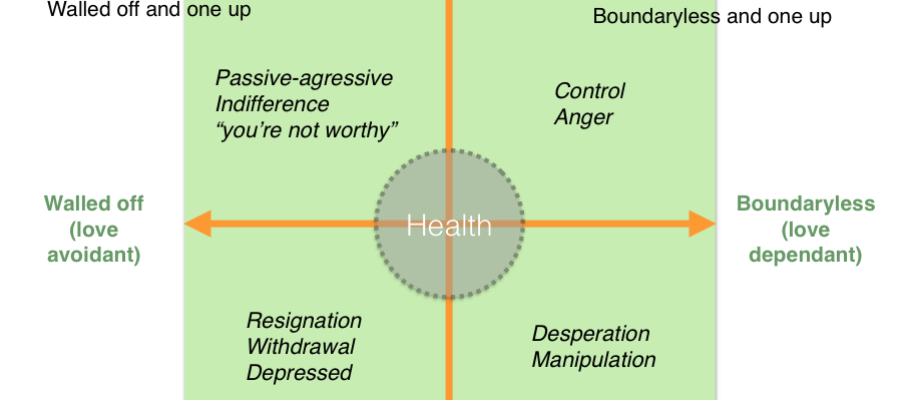How to Break the Fight Cycles in Couple Relationships
Do you get stuck in endless arguments that you do not know how to break free from? There is a way to understand what keeps this negative cycle going. As a couples’ therapist, I like to use the Relationship Grid for this purpose.
The Relationship Grid™, (Diagram 1), gets to the root of where a couple is at the worst of times and what they can do differently to be in a healthy and loving relationship.
The grid is a relational diagnostic assessment tool. Boundaries are on the horizontal line, self-esteem is on vertical line, and a healthy relationship is in the middle. You can be boundaryless or walled off, or you can be one up (grandiose) or one down (shame filled). When you put these together, you get four quadrants: boundaryless and one up, boundaryless and one down, walled off and one up, and walled off and one down. If you are on the boundaryless side, you are love dependant. If you are primarily behind walls you are love avoidant. The adjectives in each quadrant give examples of typical losing strategy behaviours when couples feel distant from one another. The centre of the grid reflects both a healthy self-esteem and boundaries. The centre of the grid represents relational enpowerment and the belief that taking good care of yourself is taking care of the relationship.

Diagram 1: The Relationship Grid™, The New Rules of Marriage: What You Need to Make Love Work, Random House, Terrence Real.
Questions to ask yourself when your relationship feels distant:
- Think about your self-esteem. Am I one-up, or one-down? Do I feel deflated and shame-filled, or inflated and grandiose?
- Next, think about your boundaries. Am I uncontained, letting too much out, or walled off, letting nothing out? Am I too porous, or not open enough?
- Where do you think you and your partner are on the grid?
For example, the more you are angry, the more your partner distances. Or, the more you are indifferent, the more your partner becomes desperate? Or, are you both controlling, trying to be right until one of you withdraws? There are many other combinations of relationship distance.
- Where am I and how do I come into the circle of health?
Knowing where you each are when your relationship feels distant, will help you to know how to come into the circle of health, where you feel closer to each other.
Some winning strategies for a close relationship include:
- Come out of shame and grandiosity to a place of healthy self-esteem
- If you are boundaryless, reset your boundary and remember that you are enough and you matter
- If you are walled off, express your feelings and ask for what you need
- Respond with generosity
- Respect each other
- Have empathy for each other
- Cherish your partner
- Stay connected and protected in your relationship
- Shift from complaint to request
- Speak out with love and moderation
- Be honest about your vulnerabilities
When each partner is in a place closer to health, then it becomes easier to understand the family of origin dynamics, resolve conflicts, grieve past issues, enhance sexual connection, become more emotionally intimate and learn effective communication skills.
At CBT Psychology, I can assist you to explore these dynamics in your relationship and find ways of feeling closer in your relationship.
Clare Mézes sees individuals and couples at CBT Psychology in Thornhill, Ontario. She also has a private practice in North York and Toronto. She is a Registered Psychotherapist, Registered Marriage and Family Therapist, a Clinical Fellow with OAMFT/AAMFT, a Certified Sex Therapist and Certified Relational Life Therapist. She has an uncanny ability to get to the heart of issues giving individuals and couples the tools they need to optimize the full potential of their relationships.
Written By: Clare E. Mézes, MSc, RP, RMFT, CST, RLT



















